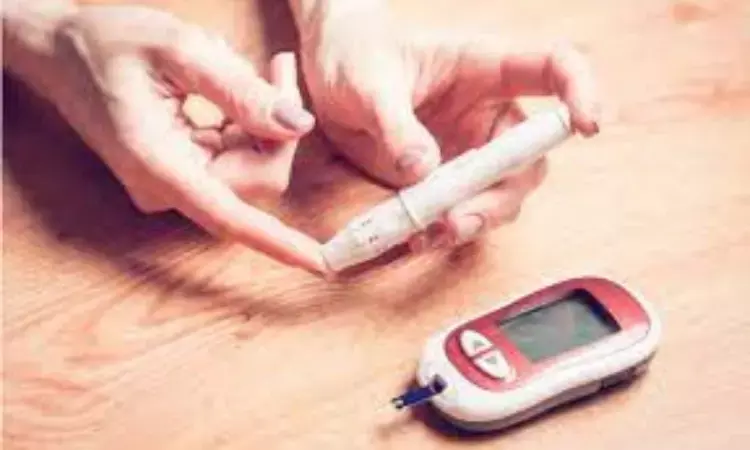- Home
- Medical news & Guidelines
- Anesthesiology
- Cardiology and CTVS
- Critical Care
- Dentistry
- Dermatology
- Diabetes and Endocrinology
- ENT
- Gastroenterology
- Medicine
- Nephrology
- Neurology
- Obstretics-Gynaecology
- Oncology
- Ophthalmology
- Orthopaedics
- Pediatrics-Neonatology
- Psychiatry
- Pulmonology
- Radiology
- Surgery
- Urology
- Laboratory Medicine
- Diet
- Nursing
- Paramedical
- Physiotherapy
- Health news
- Fact Check
- Bone Health Fact Check
- Brain Health Fact Check
- Cancer Related Fact Check
- Child Care Fact Check
- Dental and oral health fact check
- Diabetes and metabolic health fact check
- Diet and Nutrition Fact Check
- Eye and ENT Care Fact Check
- Fitness fact check
- Gut health fact check
- Heart health fact check
- Kidney health fact check
- Medical education fact check
- Men's health fact check
- Respiratory fact check
- Skin and hair care fact check
- Vaccine and Immunization fact check
- Women's health fact check
- AYUSH
- State News
- Andaman and Nicobar Islands
- Andhra Pradesh
- Arunachal Pradesh
- Assam
- Bihar
- Chandigarh
- Chattisgarh
- Dadra and Nagar Haveli
- Daman and Diu
- Delhi
- Goa
- Gujarat
- Haryana
- Himachal Pradesh
- Jammu & Kashmir
- Jharkhand
- Karnataka
- Kerala
- Ladakh
- Lakshadweep
- Madhya Pradesh
- Maharashtra
- Manipur
- Meghalaya
- Mizoram
- Nagaland
- Odisha
- Puducherry
- Punjab
- Rajasthan
- Sikkim
- Tamil Nadu
- Telangana
- Tripura
- Uttar Pradesh
- Uttrakhand
- West Bengal
- Medical Education
- Industry
Blood sugar control may slow biological ageing in diabetes patients

USA: Diabetes is recognized as an important cause of premature death and disability. In the past three decades the age-standardized prevalence of diabetes has risen substantially in countries at all income levels. It is not largely established whether blood sugar control has role in slowing ageing process.
Data analysis from the Look AHEAD study showed that greater blood sugar control among type 2 diabetes patients could slow biological ageing.
The findings from the study, published in Diabetes Care, suggest that strategies for diabetes control through metformin use or weight loss may also slow ageing.
"Low HbA1c (glycated hemoglobin) levels in adults with diabetes is linked with slower biological ageing as captured by a deficit accumulation frailty index (FI)," Felicia R. Simpson from the Department of Mathematics at Winston-Salem State University in Winston-Salem, NC, and colleagues stated in their study.
"Among patients with type 2 diabetes, poorer glycemic control is linked with greater frailty and worse frailty profiles over time," they explained. "Frailty progressed more slowly in patients treated with metformin and those achieving weight loss which may reflect slower biological ageing."
The research team aimed to describe longitudinal and cross-sectional between HbA1c levels and strategies for controlling type 2 diabetes with baseline levels and 8-year changes in deficit accumulation FI, a frequently used marker of biological ageing.
For this purpose, they conducted exploratory analyses from 4,169 participants (aged 45-76) who were followed in the Look AHEAD randomized control trial (Action for Health in Diabetes), pooling data across intervention groups. Baseline and 8-year levels of HbA1c were related to frailty index scores. Bias associated with differential follow-up was assessed using Inverse probability weighting. They also evaluated associations between 8-year changes in FI and diabetes medication use and weight changes with control for HbA1c levels.
The study revealed the following findings:
- Average and baseline levels of HbA1c over time of less than 7%, as compared with 8% or greater, were linked with lesser increases in FI scores during the follow-up period of 8 years.
- The authors highlighted that the correlation between baseline HbA1c and frailty index was modest and approximately linear based on spline regression.
- In analyses adjusted for HbA1c levels, weight loss of greater than 5% and metformin use were independently associated with gradual increases in a frailty index.
"Lower glycated haemoglobin levels among patients with diabetes are linked with slower biological ageing as reflected by a deficit accumulation FI," the authors conclude. "Strategies for diabetes control through metformin use or weight loss may also slow ageing."
Reference:
Felicia R. Simpson, Jamie N. Justice, Scott J. Pilla, Stephen B. Kritchevsky, Edward J. Boyko, Medha N. Munshi, Chloe K. Ferris, Mark A. Espeland; for the Action for Health in Diabetes (Look AHEAD) Trial, An Examination of Whether Diabetes Control and Treatments Are Associated With Change in Frailty Index Across 8 Years: An Ancillary Exploratory Study From the Action for Health in Diabetes (Look AHEAD) Trial. Diabetes Care 2022; dc221728. https://doi.org/10.2337/dc22-1728
Dr Kartikeya Kohli is an Internal Medicine Consultant at Sitaram Bhartia Hospital in Delhi with super speciality training in Nephrology. He has worked with various eminent hospitals like Indraprastha Apollo Hospital, Sir Gangaram Hospital. He holds an MBBS from Kasturba Medical College Manipal, DNB Internal Medicine, Post Graduate Diploma in Clinical Research and Business Development, Fellow DNB Nephrology, MRCP and ECFMG Certification. He has been closely associated with India Medical Association South Delhi Branch and Delhi Medical Association and has been organising continuing medical education programs on their behalf from time to time. Further he has been contributing medical articles for their newsletters as well. He is also associated with electronic media and TV for conduction and presentation of health programs. He has been associated with Medical Dialogues for last 3 years and contributing articles on regular basis.
Dr Kamal Kant Kohli-MBBS, DTCD- a chest specialist with more than 30 years of practice and a flair for writing clinical articles, Dr Kamal Kant Kohli joined Medical Dialogues as a Chief Editor of Medical News. Besides writing articles, as an editor, he proofreads and verifies all the medical content published on Medical Dialogues including those coming from journals, studies,medical conferences,guidelines etc. Email: drkohli@medicaldialogues.in. Contact no. 011-43720751


